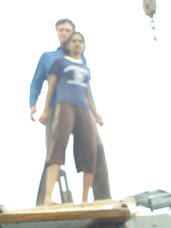A few quotes from a Computer World article by attorney Lawrence Savell:
"Statements may be protected if they are truly opinions and are not capable of being proved either true or false."
"Truth is a complete defense to a defamation claim, but it’s still a good idea to reduce risks by incorporating less-than-absolute words like “may” or “might” or terms like “alleged” or “reported.”"
"Be sure you incorporate only material that you own or that you have permission or the right to use. There is one exception: “Fair use” allows other parties besides the copyright owner to use copyrighted material in a reasonable manner without the owner’s consent in certain circumstances. Common examples include parody, criticism, commentary and news reporting."
And for the Roid-hovians
"Certain blogs(like 1000days) may be viewed in whole or part as advertisements. An example: the blog of a business that pointedly extols the quality of its staff and services to potential customers and clients. If so, bloggers must comply with applicable advertising, consumer protection, deceptive practice and unfair-competition laws and regulations."
Savell is a litigator at the New York office of Chadbourne & Parke LLP who deals regularly with technology and the law.
Subscribe to:
Post Comments (Atom)
Vandalism and Fair Use
It seems that some energetic fans of Mr. Stowe have discovered this site and have a problem with it's content; All posts are welcome here whether you agree with this blog or not; however, nonsensical posts will be deleted.
We suggest you research the following terms: public figure, parody, and fair use.....and lighten up a bit, hey?
We suggest you research the following terms: public figure, parody, and fair use.....and lighten up a bit, hey?















No comments:
Post a Comment